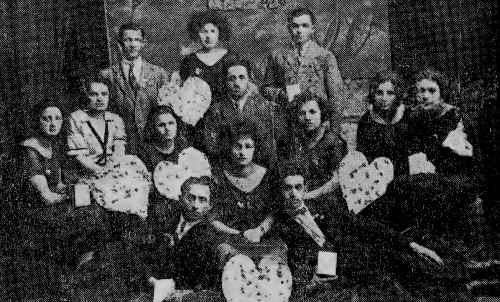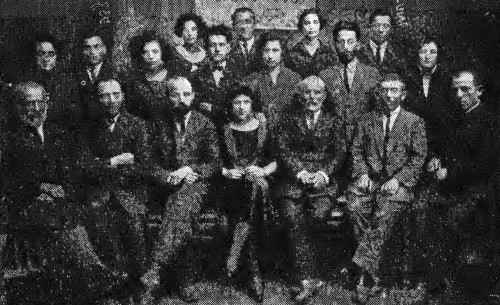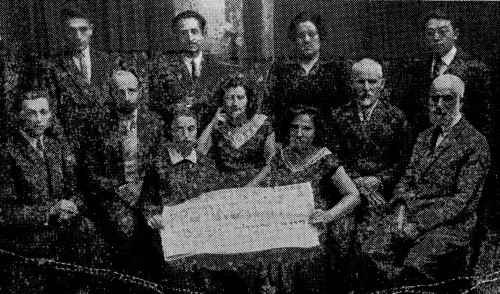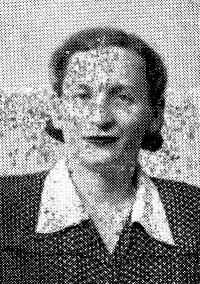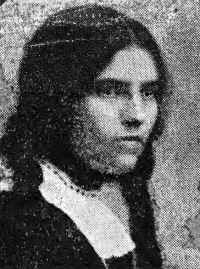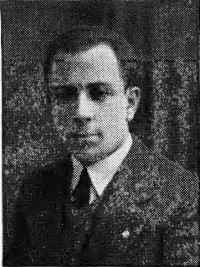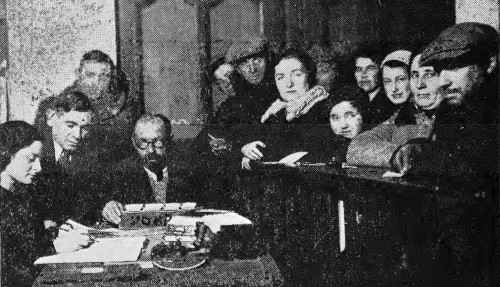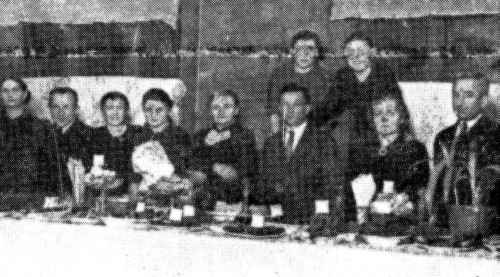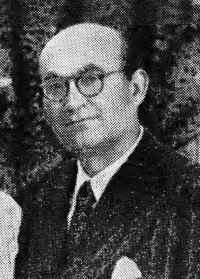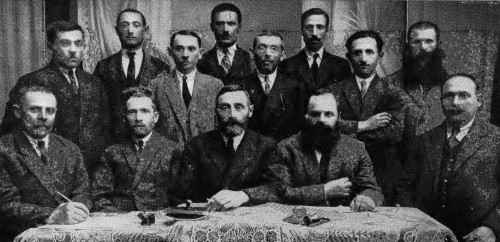[Page 192]
The Society to Spend the Night
with the Sick and the Medical Aid Society
by Henie Piekelny – Rozenblum (Ra'anana)
Translated by Janie Respitz
Our town Zhetl was a state unto itself. The concern for social aid, health and even self defence was found among devoted community activists who benefited from general sympathy.
As we know, Jews of Zhetl excelled in helping the needy and lived by the biblical passage which states Jews are responsible for one another.
Before the First World War Zhetl had a Society to Spend the Night with the Sick, a Medical Aid Society and an Interest Free Loan Society. One of the most devoted activists in these institutions was my father, Reb Yisroel Elkhanan Piekelny, of blessed memory. He was responsible for the town ice cellar and the Interest Free Loan Society.
Often, they would wake him in the middle of the night requesting ice for a sick person who had a fever. My father, of blessed memory, would fulfill this good deed with devotion and a smile so that they would not think, God forbid, it was an effort for him.
A totally different type of work was the Interest Free Loan Society. Not only did they have to worry about distributing money, they also had to make sure the fund would grow its credit possibilities. In order to achieve this they would collect usury as well as income from payment for honours to come up to the Torah. A portion of the collected money went to the Medical Aid Society and supplementary nourishment for the needy.
|
|
Participants in the Flower Day on behalf of the Medical Aid Society 1926
From right to left – seated in the first row: Yoel Tcheplovodsky, Khaye Dvoyre Savitsky, Leybl Mirsky
Second row seated: Sime Shapiro, Mania Rabinovitch, Karpelovitch, Avrom Savitsky, Rokhl Obershteyn, Senderovsky, Dina Shilovitsky
Standing: Hirshl Belaus, Henie Piekelny, Yakov Pilnik |
The Society to Spend the Night with the Sick played an important role in Zhetl. In those years Zhetl did not have a hospital. Patients would remain at home, often for a long time which would exhaust the family. The society would send someone to spend the night with the patient so the family members could get some rest.
Almost all of Zhetl signed up. This institution was run by a committee divided into the following functions: a chairman, secretary and those responsible for certain streets. A family in need would approach the chairman who would bring the request to those responsible for the streets. The person responsible for that particular street would send someone to spend the night according to a list.
Around 11–12 at night they would check if the person was on duty. If not, they would go to his house and pull him out of bed.
The Society to Spend the Night with the Sick had a warehouse and supplies. According to orders from the doctor the patient would receive what he needed and return them once he recovered.
This is how they worked all year long with great devotion, day and night, visiting the sick and the needy.
At the beginning of the German occupation in 1915 the social aid activity was stopped. In 1923, when life in town normalized it was decided to renew the activities of the Society to Spend the Night with the Sick. Two women, one of whom was Bayle Tentzer went through the town to enlist members for the Society to Spend the Night with the Sick and the Medical Aid Society.
By that time I was busy organizing the “Young Pioneer” organization. The women approached me to organize the institution because the previous activists were either too old or sick.
I accepted this task and wanted to express appreciation for the previous workers.
I did this work alone for about a year and a half without any help. I would distribute the night shifts and with my study books under my arm, go around and check.
[Page 193]
If I did not find the one who was supposed to be on duty sitting with the patient, I would remain for the rest of the night. This is how I continued with this sacred work and made sure no patient would be left alone.
Tired from the burden and responsibility I turned to Moishe Ruven Mordkovsky of blessed memory for help. One evening we organized a general meeting in the old House of Study. I gave a report of the work and suggested we form a committee of 18 people. My suggestion was accepted. Among others chosen for the committee were: Moishe Ruven Mordkovsky – chairman, me as secretary, Yenkl Yudl the son of the ritual slaughterer, Yisroel Ozer Barishansky, Shmuel Shvedsky, Avrom Alpert, Noyakh Mikulitsky, my sister Badaneh and others.
The newly elected committee approached the work with great zeal. We would often organize parties for the volunteers in the Society to Spend the Night with the Sick and Yenkle Yudl, the ritual slaughterer's son would entertain everyone with his beautiful voice. On the Sabbath of VeYikhye, we would host a reception for all the residents of Zhetl, which made everyone happy.
It is hard to imagine the unity and the friendship that existed among these workers.
|
|
Going away party for Khaya Savitsky 1930
Seated: Aron Kontzevik, Shmuel Shvedsky, Sonia Shalkovitch, Khaya Savitsky, Elke Khaya Dzhenchelsky, Moishe Ruven Mordkovsky, Volf Leybovitch
Standing: Noyakh Mikulitsky, Soreh Rabinovitch, Avrom Savitsky, Sholem Reznitsky |
|
|
Going away party for Henie Piekelny 1926 at the Society to Spend the Night with the Sick and the Medical Aid Society
From right to left: – seated in the first row: Berl Dvoretsky, Avrom Moishe Barishansky, Shmuel Shvedsky, Henie Piekelny, Moishe Ruven Mordkovsky, Gershon Zhukhovitsky, Aron Kontzevik
Standing in the second row: Khaya Savitsky, Mordkhai Sokolovsky, Shifra Savitsky, Yoel Tcheplovodsky, B. Piekelny, Hirshl Bielaus, Rivka Lusky
Standing in the last row: Yakov Pilnik, Elke Dzhenchelsky, Avrom Savitsky, Soreh…. |
All members were ready to be called upon day or night. We would even have someone stay with a contagious patient.
The devotion of the committee was contagious. I, the youngest of the group devoted myself to this work and received great satisfaction.
In 1926 I was preparing to immigrate to the Land of Israel. I will never forget the farewell banquet they prepared for me. We enjoyed the evening at the home of Yisroel Ozer Barishansky and we were all photographed. Yenkl Yudl the ritual slaughterer's son did not want to be photographed, but he entertained us all.
That evening was very enjoyable. It was so hard to leave! No one imagined we would never see each other again.
The tragedy that took away our best friends that worked to help Zhetl's needy Jews was horrific.
[Page 194]
The Orphans Committee
by Shifra Medvedsky, Montreal
Translated by Janie Respitz
The founders of the Zhetl Orphans Committee were: Moishe Ruven Mordkovsky, and Peshke Langbart. They both devoted heart and soul to this work and sacredly fulfilled their obligations.
The orphans would go to Moishe Ruven as if to a father and he would answer everyone with a smile. His mother – in law would stand at a distance grumbling and wringing her hands because her son in law was neglecting his livelihood and was busy with charity work. His wife however, was loving and kind like him.
His life in general was heartache, illness and troubles. After many months laid up in bed, he died young of lung disease. The town mourned him.
After his death, Peshke Langbart took over this work. I remember they had to send a few orphans to the Land of Israel and there was not enough money.
They approached their families for a contribution and organized a performance at “Tarbut” with a nice buffet, and collected the necessary funds. Peshke was happy the task was accomplished. This is how she managed to provide the orphans with clothes and shoes.
I saw this all as a child and promised that when I grew up I would also work toward this sacred goal. And that is what happened. I got to know Peshke through the “Tarbut'' drama club and the bazaars for the Jewish National Fund.
Once, during a meeting of the drama club, Peshke asked me to come to her house because the Orphans Committee together with “Tarbut'' were organizing an evening and they needed help. When I arrived at Peshke's I met: Khaye Bielitzky, Fruma and Sonia Shilovitsky, Etl Rozenfeld, Nekhame Goldberg, Bobtche Beshkin and other women. We had to decide what type of ball we were going to organize and what it should be called. Since it was autumn we decided to name it: “The Autumn Ball”.
The hall had to be decorated with yellow leaves. Peshke called together all of her daughter Khasia's friends and of few other girls and we went to the forest to collect bags full of leaves.
At the “Tarbut” school we sewed the leaves into garlands. Hirshl Kaplinsky, a devoted volunteer for “Tarbut” hung the wreaths from wall to wall.
The hall was beautifully decorated and the ball was one of the nicest ever in Zhetl and raised a lot of money. The orchestra gave us a discount and Peshke was thrilled. I don't remember the exact year, but I think this was the last ball in Zhetl. When the Russians came, everything faded away.
During the German occupation I hardly ever saw Peshke. Her husband was taken with the first 120 victims. After she escaped from Zhetl I saw her in Dvoretz. She was broken like the rest of us.
Social Women's Aid
by Soreh Gal – Begin, Jerusalem
Translated by Janie Respitz
Zhetl was known throughout the region for its social institutions. Among others, an important place was held by Social Women's Aid whose important task was to help poor pregnant women, brides and all those in need. The following belonged to the committee: Dvoyre Senderovsky, Mertche Gal and Bayle Tentzer.
For a minimal salary, Bashe Drayzl Karpelovitch would go around town collecting monthly dues from the women. Every year at Dvoyre Senderovsky's house and our house, we would make jam for poor pregnant women. Our neighbours Rokhl the blacksmith's wife and Henie the painter would participate in this good deed helping to stir the jam so God forbid, it wouldn't burn.
The community leader was Khayke Zernitzky. She would reach every poor corner. She would gather items and distribute them among the poor children at the Talmud Torah. She knew when a child was born, and which poor girl lacked a trousseau. When a tragedy occurred she would send out a few women to help out as quickly as possible.
Year in and year out the cellars were filled, then emptied. The fund as well. Every year the list of those in need changed but the committee remained the same.
Many did not know about this quiet sacred work however those in need felt the help as well as the activism.
This small society of women's aid was wiped out with all the other institutions.
[Page 195]
The Popular Bank
by Arye Zelikovitch
Translated by Janie Respitz
The Zhetl Popular Bank was founded in 1923. Before the bank was founded Zhetl had an Interest Free Loan Society that gave out small loans to craftsmen and small businesses. However, larger business owners did not have a financial institution which could finance their businesses which were based on promissory notes and open credit.
Rabbi Zalmen Saratzky who was involved in every aspect of communal life was also involved in creating a bank in Zhetl.
Due to his initiative a general meeting was called with all the businessmen and merchants and they decided to found a Cooperative Popular Bank. Besides the rabbi the founding members were: Yitzkhak Kaplinsky, Shmuel Kustin, Yisroel Ozer Barishansky, Meir Kovensky and others.
The capital of the bank was based on fees of up to 10% of the certified loan, deposits and a loan from the “Joint” in Warsaw. With this capital the bank began its activity with great success.
The first director, secretary and bookkeeper of the bank was Khaim Kaplinsky. He devoted himself completely to this work. He could be seen after working hours sitting in the bank reviewing the books.
Within two years the volume of work grew and it became necessary to increase personnel. This is when they hired Reb Yeshayahu Moishe Pilnik as a cashier. He excelled in his habits, and was honest and kind.
After a few years of existence the bank grew to 600 members. Merchants, small businessmen and craftsmen began to carry out their financial operations through the bank. This is where they bought their promissory notes, received credit and deposited their savings.
With the broadening of operations and membership the bank decided to move to a new location and hire more people. They rented space at A. Lusky's at the marketplace. After, since Khaim Kaplinsky left his job at the bank, he was replaced by Yerukham Izraelit from Novoredok. Yitzkhak Kaplinsky who had until this time been active in administration of the bank was elected director and I, the writer of these lines was chosen as clerk. A year later we hired another employee, Basia Rabinovitch. By 1928 there were 6 people working at the bank including the beadle Movshovitch.
From 1927 – 1933 the amount of members grew and the maximum loan received by a member was up to one thousand zlotys.
The bank became one of the most useful and popular institutions in Zhetl. It helped the Jewish merchant and craftsman in their difficult struggle to earn a living.
Besides the administration the general meeting also elected a bank council. The active members were: Khaim Ganuzovitch, Meir Kovensky, Khaim Levit, Alter Bom, Moishe Mendl Leyzerovitch, Yehoshua Shusahn, The Barishansky brothers and tens of others whose names I do not recall, but they devoted a lot of energy and time to the development of the bank.
I worked at the bank for 6 years until one fine day, about 20 years ago, I left my job and immigrated to the Land of Israel.
These memories are fresh, as if they occurred yesterday. All the clients and members of the bank with whom I had daily contact stand before my eyes. It hurts my heart and I cannot find comfort knowing that this institution which was built over many years with so much devotion, was, within a few days, together with its activists, so cruelly murdered.
[Page 196]
Balances of the Zhetl Cooperative Popular Bank
*According to statistics from the Union of Credit Cooperatives
Translated by Janie Respitz
Balance December 12, 1929
Active
| Treasury |
4981 zlotys |
| Rent |
70 zlotys |
| Securities and payments to other institutions |
1000 zlotys |
| Promissory loans |
56827 zlotys |
| Moveable property |
360 zlotys |
| Various accounts |
445 zlotys |
| Administrative costs |
3250 zlotys |
| Interest rates, provisional installments |
3043 zlotys |
| Collector documents |
10490 zlotys |
| General balance total |
80466 zlotys |
| |
| Passive |
| Payments |
8188 zlotys |
| Reserve fund |
650 zlotys |
| Deposits and operating accounts |
42706 zlotys |
| Debts to Central Cooperative |
12500 zlotys |
| Other accounts |
171 zlotys |
| Rates and postage of loans |
4793 zlotys |
| Provisions from other operations |
968 zlotys |
| Various debts |
10490 zlotys |
| General balance total |
80466 zlotys |
| |
| Information |
| Amount of loans |
320 zlotys |
| Sum of loans |
175766 zlotys |
| Average rate of loans |
549 zlotys |
| Received deposit documents |
1397 zlotys |
| A total of |
214010 zlotys |
|
|
In the office of the Interest Free Loan Society 1939
Among the clients standing: Khaim Berl Izbornitsky, Shayne Levit, Esther Busel, Soreh Fin, Dvoyre Tinlovirsky, Aron Vinarsky
In the background: Khaye Movshovitch. In the office: Nakhman Gal, Yakov Obershteyn, Hirshl Busel, Malke Lusky |
Balance December 31, 1931
Active
| Treasury |
1474 zlotys |
| Rent |
162 zlotys |
| Securities and payments to other institutions |
6250 zlotys |
| Habitual promissory loans |
56879 zlotys |
| Deposits |
9281 zlotys |
| Other credits |
797 zlotys |
| Immoveable properties |
5451 zlotys |
| Moveable properties |
1476 zlotys |
| Various accounts |
2996 zlotys |
| Administrative and organizational expenses |
13178 zlotys |
| Rate provisions |
9878 zlotys |
| Losses from the previous year |
164 zlotys |
| Documents of debts |
26673 zlotys |
| General balance total |
134659 zlotys |
| |
| Passive |
| Payments |
19257 zlotys |
| Reserve Fund |
5693 zlotys |
| Special funds |
329 zlotys |
| Deposits and running accounts |
39361 zlotys |
| Debts in the central cooperative |
20786 zlotys |
| Other accounts |
1730 zlotys |
| Percentage and postage of loans |
14374 zlotys |
| Provisions of other operations |
6223 zlotys |
| Various deposits |
26906 zlotys |
| General balance total |
134659 zlotys |
| |
| Information |
| Amount of loans |
442 zlotys |
| Total |
164496 zlotys |
| Average rate of loans |
372 zlotys |
| Discounts |
67986 zlotys |
| General balance total |
49236 zlotys |
[Page 197]
The Interest Free Loan Society
by Soreh Gal – Begin, Jerusalem
Translated by Janie Respitz
During the First World War Zhetl was not on the front lines and was not destroyed like Karelich, Lyubitch, Shieluv and other towns. However, it did suffer from offensives, counter– offensives and bandits who robbed. When life normalized after the war the residents of Zhetl who even before the war were not the richest, had to struggle to earn a living.
Once, after a conversation between the teacher Aron Hershl Langbart and his student Nakhman Gal, the plan was born to create an Interest Free Loan Fund. In order to realize this plan they turned to people from Zhetl now living in America for help.
Jews from Zhetl in America embraced this request warmly and sent the first 500 dollars. Aron Hershl Langbart and Nakhman Gal called a general meeting in the old House of Study and suggested the creation of an Interest Free Loan Fund. Those gathered warmly accepted the idea and decided to ask for dues at a minimum of one zloty.
By the second meeting the foundation stone was laid. A board of directors was chosen and this new institution was registered with the government. This was Chanukah 1926.
At the beginning the aid that was given was between 30 – 50 zlotys. With time, the fund grew as did the aid. This is thanks to the regular weekly payments of 50 groschen paid by the members and the yearly support from America. In later years, every member was able to receive a loan of up to 200 zlotys. He only had to provide two endorsers.
In the early years the fund was open to clients twice a week, later, three times a week. In urgent cases, they went to Nakhman Gal's home and he would take care of everything. The secretary of the Interest Free Loan Fund was Malke Lusky.
The annual meeting took place every year on Chanukah. After giving the report they would elect a new board.
The Interest Free Loan Fund was the tree that with its branches supported and with its fruit fed hundreds of families in Zhetl.
“TOZ” in Zhetl[1]
Translated by Janie Respitz
At the end of 1923, thanks to the initiative of the teacher Akiva Baksht a group of Zhetl's Yiddishist activists came together to found a division of “TOZ” in Zhetl. The first board of directors elected at the meeting at the home of Shmerke Lobensky was comprised of the following: Gdalyahu Shvedsky – chairman, Hindke Mirsky, Etl Ovseyevitch, Herman and Khane Malke Frenkel and Lize Kovensky.
Within a few years, Zionist activists joined the “TOZ” board like: Aron Alpert, Dvoyre Gorodaysky, Hirshl Kaplinsky, Khane Obershteyn, Khaye Ovsyevitch and others.
One of the most important accomplishments of “TOZ” was the summer camp in Novayelenia and the half summer camp in Zhetl.
|
|
Banquet for the sponsors of TOZ 1938
First row: Moishe Mirsky, Eydele Farfl, Yitzkhak Leybovitch, Feygl Epshteyn, Shlime Daykhovsky, ….., Khasie Kaplinsky, Hirshl Kaplinsky, Etl Ovsyevitch
Second row: Hindke Mirsky, Fraydl Mnuskin |
After the fire in 1933 over 100 poor and weak children went to the summer camp in Novayelenia.
The second most important activity of “TOZ” in Zhetl was devoted to feeding 400 school children. Over 50% of the children received this food for free. The rest paid 5 groshn.
The sanitation action played an important role as well. Sanitation patrols would check hygiene conditions. “TOZ” would also distribute linens and cod –liver oil to needy and sick children.
The revenue of “TOZ” came from traditional Zhetl ventures: membership dues, flower days, dances, aid from the “TOZ” central office and a small subsidy from Zhetl city hall.
Translators' footnote:
- “TOZ” is the Polish acronym for the Society for Safeguarding the Health of the Jewish People Return
[Page 198]
Remember!
by Moishe Man, Buenos Aires
Translated by Janie Respitz
After the European destruction one often heard the expression: “Continuation” meaning we should continue with the lives we lived in the old home, because the greatest art in the world is the art of knowing how to live. Our parents possessed this art. In the poorest of times they lived a rich spiritual life and lived by the words: Love thy neighbour as you love yourself!
Despite the greatest suffering which everyone experienced, they were always ready to help another as much as they could. How many institutions did they support with their weak forces? There was the Tarbut School, the craftsmen's union, a merchant's union, and more and more. Who is even capable of counting all the institutions, unions and political parties.
We also had a beautiful library under the direction of Yitzkhak Leybovitch. How devoted was he to this library, how difficult it was to collect a few books not to mention a wagon load of wood needed in the winter to heat the room. If anyone in Zhetl read a book it was thanks to Yitzkhak Leybovitch.
There was a Yiddish school where many children from the poorest families went. Every year Jewish intellectuals graduated proficient in Yiddish and world literature.
We maintained an Interest Free Loan Fund, with which every loan saved a small businessman or a craftsman.
The Society to Visit the Sick made sure that God forbid, no poor person would lack a doctor or prescription.
The Society to Spend the Night with the Sick, so the family could rest.
There was a Society to Save the Fallen offering loans at low interest, and the poorest of the poor who had to be helped discreetly. Remember all these institutions.
|
|
Tradesmen Committee
From right to left – first row: Avrom Zobelinsky, Yitzkhak Kaplinsky, Leyb Lusky, Yakov Borukh Kaplinsky, Morkhai Lusky
Second row standing: Zaydke Rzvosky, Avrom Savitsky, Yitzkhak Moishe Gafanovitch, Avrom MoisheBarishansky, Mordkhai Mishkin, Asher Levit, Bezalel Moshkovsky, Khaim Mikhl Roznov |
This material is made available by JewishGen, Inc.
and the Yizkor Book Project for the purpose of
fulfilling our
mission of disseminating information about the Holocaust and
destroyed Jewish communities.
This material may not be copied,
sold or bartered without JewishGen, Inc.'s permission. Rights may be
reserved by the copyright holder.
JewishGen, Inc. makes no representations regarding the accuracy of
the translation. The reader may wish to refer to the original material
for verification.
JewishGen is not responsible for inaccuracies or omissions in the original work and cannot rewrite or edit the text to correct inaccuracies and/or omissions.
Our mission is to produce a translation of the original work and we cannot verify the accuracy of statements or alter facts cited.
 Dzyatlava, Belarus
Dzyatlava, Belarus
 Yizkor Book Project
Yizkor Book Project
 JewishGen Home Page
JewishGen Home Page
Yizkor Book Director, Lance Ackerfeld
This web page created by Jason Hallgarten
Copyright © 1999-2026 by JewishGen, Inc.
Updated 05 Feb 2021 by JH
